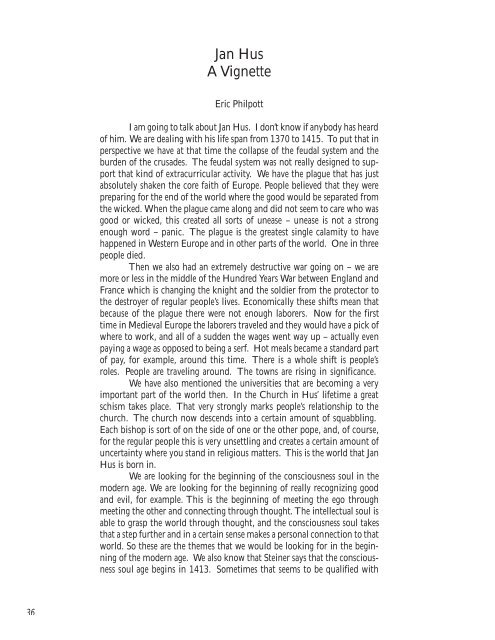Proceedings Colloquium on World History - Waldorf Research Institute
Proceedings Colloquium on World History - Waldorf Research Institute
Proceedings Colloquium on World History - Waldorf Research Institute
Create successful ePaper yourself
Turn your PDF publications into a flip-book with our unique Google optimized e-Paper software.
Jan Hus<br />
A Vignette<br />
Eric Philpott<br />
I am going to talk about Jan Hus. I d<strong>on</strong>’t know if anybody has heard<br />
of him. We are dealing with his life span from 1370 to 1415. To put that in<br />
perspective we have at that time the collapse of the feudal system and the<br />
burden of the crusades. The feudal system was not really designed to support<br />
that kind of extracurricular activity. We have the plague that has just<br />
absolutely shaken the core faith of Europe. People believed that they were<br />
preparing for the end of the world where the good would be separated from<br />
the wicked. When the plague came al<strong>on</strong>g and did not seem to care who was<br />
good or wicked, this created all sorts of unease – unease is not a str<strong>on</strong>g<br />
enough word – panic. The plague is the greatest single calamity to have<br />
happened in Western Europe and in other parts of the world. One in three<br />
people died.<br />
Then we also had an extremely destructive war going <strong>on</strong> – we are<br />
more or less in the middle of the Hundred Years War between England and<br />
France which is changing the knight and the soldier from the protector to<br />
the destroyer of regular people’s lives. Ec<strong>on</strong>omically these shifts mean that<br />
because of the plague there were not enough laborers. Now for the first<br />
time in Medieval Europe the laborers traveled and they would have a pick of<br />
where to work, and all of a sudden the wages went way up – actually even<br />
paying a wage as opposed to being a serf. Hot meals became a standard part<br />
of pay, for example, around this time. There is a whole shift is people’s<br />
roles. People are traveling around. The towns are rising in significance.<br />
We have also menti<strong>on</strong>ed the universities that are becoming a very<br />
important part of the world then. In the Church in Hus’ lifetime a great<br />
schism takes place. That very str<strong>on</strong>gly marks people’s relati<strong>on</strong>ship to the<br />
church. The church now descends into a certain amount of squabbling.<br />
Each bishop is sort of <strong>on</strong> the side of <strong>on</strong>e or the other pope, and, of course,<br />
for the regular people this is very unsettling and creates a certain amount of<br />
uncertainty where you stand in religious matters. This is the world that Jan<br />
Hus is born in.<br />
We are looking for the beginning of the c<strong>on</strong>sciousness soul in the<br />
modern age. We are looking for the beginning of really recognizing good<br />
and evil, for example. This is the beginning of meeting the ego through<br />
meeting the other and c<strong>on</strong>necting through thought. The intellectual soul is<br />
able to grasp the world through thought, and the c<strong>on</strong>sciousness soul takes<br />
that a step further and in a certain sense makes a pers<strong>on</strong>al c<strong>on</strong>necti<strong>on</strong> to that<br />
world. So these are the themes that we would be looking for in the beginning<br />
of the modern age. We also know that Steiner says that the c<strong>on</strong>sciousness<br />
soul age begins in 1413. Sometimes that seems to be qualified with<br />
36
















